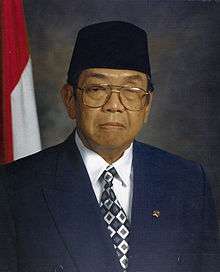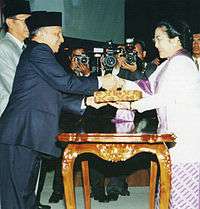Abdurrahman Wahid's 23 July 2001 Decree
President of Indonesia Decree of 23 July 2001 (Indonesian: Maklumat Presiden Republik Indonesia 23 Juli 2001) was issued by the fourth President of Indonesia, Abdurrahman Wahid, on the climax of his standoff against the People's Consultative Assembly (MPR) and other parts of the society, which includes the Indonesian National Armed Forces (TNI).[1]

The decree ordered the disbandment of the People's Consultative Assembly (MPR) and the People's Representative Council (DPR), to "return the sovereignty to the people" by calling a general election to be held in a year, and to remove all remnants of the New Order regime by disbanding Golkar Party.[2]
The parliament retaliated against Wahid's decree and immediately hold a special session of the MPR to impeach Wahid on the very same day. Wahid's position further cornered by TNI-POLRI refusal to abide by his decree. The decree saw the downfall of Wahid from his presidency as the impeachment motion was successfully passed by the MPR, and Megawati Soekarnoputri was voted to succeed him as the President on the following day.
Background
President of Indonesia action to enact a decree already had its precedent from 1959, when President Soekarno's Presidential Decree ordered the disbandment of the Konstituante and to reintroduce the 1945 Constitution. The 1959 Decree was enacted to address the failure of the Konstituante to draw a new constitution to replace the 1950 Provisional Constitution, and then to vote on a two-thirds majority to return to the 1945 Constitution.
Wahid presidency
From the start of his presidency, Wahid's stance and position were at odds with many politicians and members of the society. Wahid's conciliatory move to Israel and further proposal to engage in trade with the country was opposed by highly pro-Palestinian Indonesian Muslims argued that nothing could justify Indonesia relations with Israel.[3]
His relationship with the TNI was also equally turbulent. His decision to appoint his ally Agus Wirahadikusumah as Kostrad commander in April 2000 was opposed by many military top brass. The opposition was mainly caused by his reformist and highly partisan stance, especially after his audit results shown discrepancy of Kostrad finance management, and further after he personally called Wiranto to be sacked from his ministerial post. Under threat of a wave of resignations of military commanders should Agus remain, Wahid decided to bow to pressure and replace Agus with Ryamizard Ryacudu.[4]
Wahid's fluctuate relationship with his cabinet ministers resulting in total of 18 replacements of ministers in his two-years presidency. Some ministers sacked simply because of their refusal to cooperate and was showing disobedient traits, yet some others were replaced due to more serious allegations of human rights violations (of Wiranto) and suspected corrupt behaviour (of Jusuf Kalla and Laksamana Sukardi).[5]
Declaration
On a live television broadcast on 01:10 Western Indonesia Time (UTC+7) in the morning of 23 July 2001, President Wahid announced the enactment of a decree to address the recent political issue that has engulfed the country. President Wahid claimed to received substantial support from parts of the society to enact the decree, which includes members of non-governmental organisations and groups of Kyai.[2][6]
Wahid opened his declaration by claiming that the recent political issue due to prolonged constitutional crisis resulting in further economic crisis and extremely hinder his effort to eradicate corruption. He then declared that an extraordinary action must be taken in order to evade the collapse of the country.
The next paragraph was the core of the decree that consisted of 3 points: suspension of MPR and DPR, establishment of a body to prepare for an election on one-year period; and disbandment of the Golkar Party pending the Supreme Court decision. Wahid further commanding the TNI and POLRI to support the enactment of the decree, while asking Indonesian citizens to remain calm and perform their daily activities as usual.
Wahid also cited MPR Speaker Amien Rais declaration that Indonesia would "soon have a new leadership" after a meeting with political party leaders, which includes his own deputy Megawati Soekarnoputri, as his justification to enact the decree. He wished the decree would prevent the establishment of a rival government should Amien manouvre were successful.[2]
Excerpts of the decree
| ... Kami selaku Kepala Negara Republik Indonesia terpaksa mengambil langkah-langkah luar biasa dengan memaklumkan: | .. We the Head of State of the Republic of Indonesia shall take these extraordinary actions by proclaim: |
|
|
Response
The decree caused a huge uproar among MPR-DPR members that voiced their immediate opposition to the decree. The MPR, previously refraining itself from bringing forward the MPR special session scheduled in August 2001, decided to brought forward the special session by the urgency to respond on Wahid's decree.[1][7] The MPR then voted 599 to 2 votes among 601 present members to reject the decree.[8]
TNI-POLRI shown their reluctance to support Wahid despite the decree explicitly ordered their support to enforce the decree. Army Chief of Staff Endriartono Sutarto declared that the military would not intervene to block the Parliament and to contain parliamentary oppositions.[9] The TNI instead declared their support for the MPR, with their parliamentary fraction voted for the special session to take place on 23 July, and later to reject the decree.[1]

On the same day, Chief Justice of the Supreme Court Bagir Manan issued a judicial opinion declaring the decree invalid and had no legal power. Bagir argued that the MPR is supreme over the president and the president could not overpower the legislature by disbanding it unilaterally. He also argued that the president have no power to disband a political party, as the power is rested only on the Supreme Court.[8] The judicial opinion was read to MPR members prior to the special session to impeach Wahid. The judicial opinion was criticised as it was authorised only by a single Supreme Justice, while the proper procedure require the opinion to be authorised by all Supreme Justices.[8][10]
The MPR officially revoked Wahid's presidency mandate by indicted him of violating TAP MPR III/MPR/2000 after replacing Chief Police Surojo Bimantoro with Chairuddin Ismail without prior consent from the DPR.[11] This was despite MPR prior two memoranda to Wahid was on Bruneigate and Buloggate case. After revoking Wahid's presidency mandate, his deputy Megawati Soekarnoputri was voted to replace Wahid as president, while Hamzah Haz received most votes to became the vice president.[1]
Aftermath
In March 2002, Wahid issued his defence on his decision to issue the decree. He justified the decree constitutionality, and lamenting the facts that Megawati governance is no way better than him despite MPR promised intention that the impeachment was done for the sake of the country. Despite initial reluctance from Wahid to issue the defence, he later agreed to its publication as he wish to provide the future generations with the correct facts on the 23 July 2001 event.[12]
In 2016, Several Indonesian political figures including Mahfud MD, Rizal Ramli, and Luhut Binsar Pandjaitan, declared their commitment to reassess Wahid's legacy especially on events around the 23 July 2001 Decree. Luhut argued that Wahid's impeachment was motivated more by political intrigues instead of real intention to address the Buloggate and Bruneigate case, especially after Wahid was found innocent on a court verdict after the impeachment.[13]
References
- "MPR RI Cabut Mandat Pengangkatan Presiden Gus Dur" [MPR RI Revokes Gus Dur Presidency Mandate]. Parlementaria (in Indonesian). No. 36 Th. XXIII/2001. MPR RI. pp. 20–26. Retrieved 7 July 2020.
- "Presiden Umumkan Dekrit Pembekuan MPR-DPR". Hukumonline.com (in Indonesian). 23 July 2001.
- "Wahid's Move on Trade Stirs Up Nationalism Among Muslims". New York Times. 12 November 1999. Retrieved 25 June 2009.
- "Zig-Zag Gus Dur vs TNI" (in Indonesian). Republika. 5 September 2014.
- Amar Nur Ngazis (30 June 2020). "Presiden hobi reshuffle Gus Dur rajanya, copot 18 menteri dari SBY sampai JK". Hops.id (in Indonesian).
- "Maklumat Gus Dur" [Gus Dur's Decree] (PDF). Media Indonesia (in Indonesian). 19 April 2003. p. 4. Retrieved 7 July 2020.
- "Penantian Panjang Megawati Meraih Kursi RI-I" [Megawati's Long Wait for RI Presidency]. Parlementaria (in Indonesian). No. 36 Th. XXIII/2001. MPR RI. pp. 27–32. Retrieved 7 July 2020.
- "MA dan MPR Sepakat Maklumat Bertentangan dengan Hukum". Hukumonline.com (in Indonesian). 23 July 2001.
- Ramadhian Fadillah (2 June 2015). "Kisah para jenderal TNI AD melawan Gus Dur & dekrit presiden". Merdeka.com (in Indonesian).
- "Gus Dur Gugat Fatwa MA Soal Maklumat Presiden". Tempo.co (in Indonesian). 4 August 2003.
- Fana Suparman (12 January 2016). "Pemakzulan Gus Dur Tidak Sah". Beritasatu.com (in Indonesian). Suara Pembaruan.
- "Gus Dur Ingin Luruskan Sejarah Soal Maklumat Presiden". Tempo.co (in Indonesian). 4 August 2003.
- Fana Suparman (12 January 2016). "Meluruskan Fakta Sejarah Lengsernya Gus Dur". Beritasatu.com (in Indonesian).